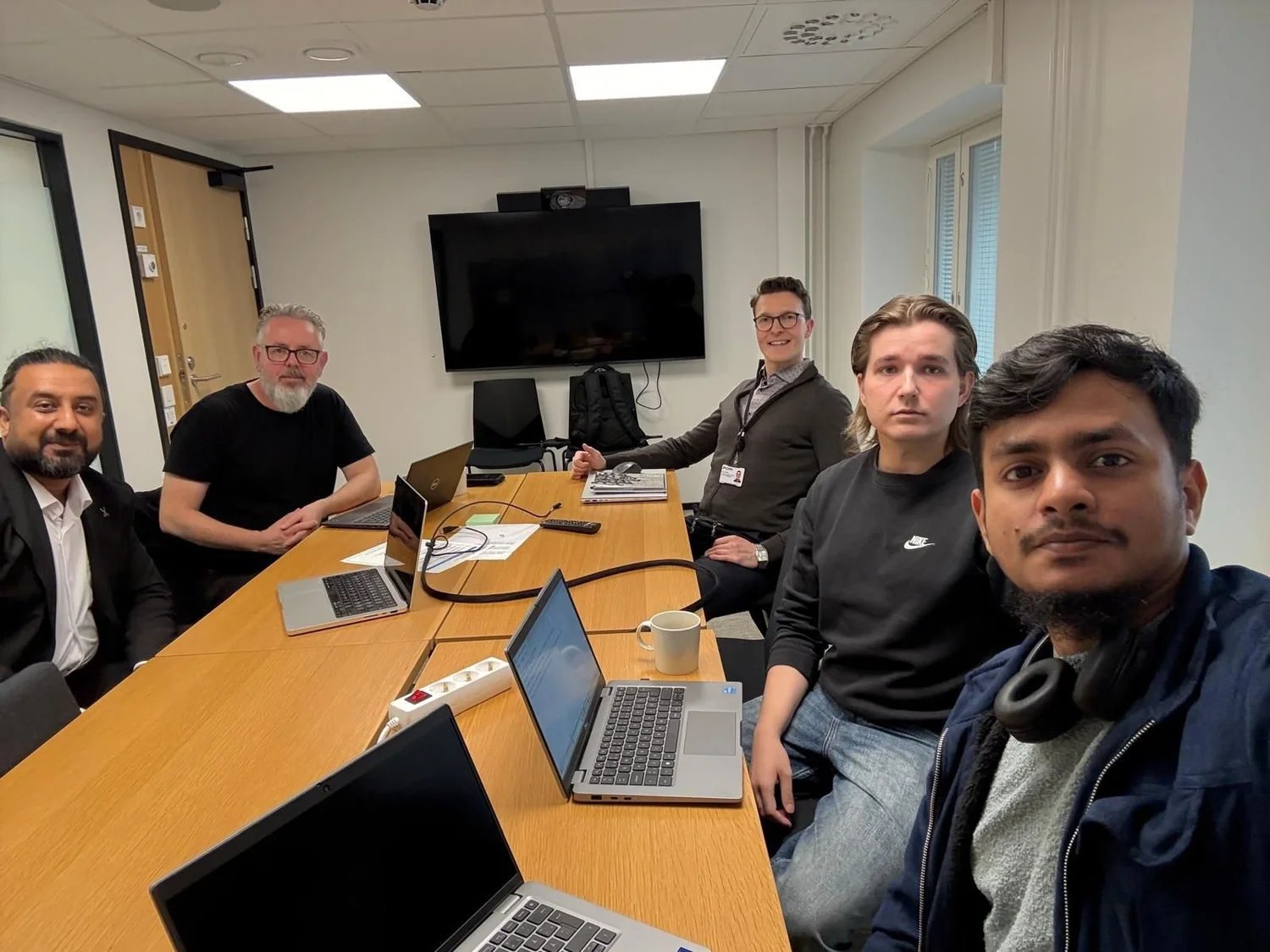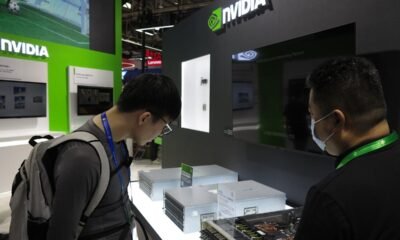Tools & Platforms
Samsung Tackles Chip Challenges with AI Investments and Foldable Tech

In the rapidly evolving world of semiconductors, Samsung Electronics Co. is navigating a complex web of challenges and opportunities as it heads into the latter half of 2025. The South Korean tech giant, a key player in memory chips and foundry services, has been grappling with supply chain disruptions and intense competition from rivals like TSMC and Intel. According to a recent report from Samsung Securities, the company faces difficulties in upward earnings revisions for general-purpose semiconductors due to ongoing production controls aimed at accelerating cycle recovery. This caution stems from uncertain capital expenditure (Capex) and utilization rate forecasts, which investors are watching closely for signs of a bottom-out.
Samsung’s strategic investments, however, signal a bold push forward. The company recently held a tool-in ceremony for its new semiconductor R&D complex, NRD-K, set to begin operations this year, with plans to pour about 20 trillion won ($14.8 billion) into advanced R&D by 2030, as detailed in the Samsung Global Newsroom. This move is part of a broader effort to bolster AI-driven semiconductors, where Samsung sees higher earnings visibility amid the global AI boom.
Investors Eye AI as Samsung’s Lifeline Amid Market Pressures
First-quarter 2025 results underscored both strengths and vulnerabilities, with Samsung reporting revenue of 79.14 trillion won and operating profit of 6.7 trillion won, per the company’s own announcements in the Samsung Global Newsroom. Yet, shareholders have pressed for growth strategies, leading CEO Kyung Kye-hyun to hint at pursuing major mergers and acquisitions this year to counter underperformance in tech stocks, as covered by Reuters. The failure to fully capitalize on AI has been a sore point, with Samsung’s foundry business posting losses of $3.6 billion in the first half of the year, though a $16.5 billion deal with Tesla for AI chips starting in 2027 offers a glimmer of hope, according to posts circulating on X from industry analysts.
Beyond semiconductors, Samsung is innovating in consumer devices to diversify revenue. The foldable smartphone segment is heating up, with the company planning to strengthen its lineup, including the rumored Galaxy G-Fold tri-fold phone slated for a late-2025 launch, as revealed in leaks reported by Geeky Gadgets. This comes amid growing competition from Huawei and Google, with market overviews from Coherent Market Insights forecasting robust industry growth through 2032.
Strategic Shifts in Foundry and Packaging Technologies
Samsung’s ambitions extend to advanced packaging, where it’s exploring Intel’s hybrid bonding technology to enhance chip density and efficiency, as noted in recent X posts from tech enthusiasts like Techo Vedas. This could position Samsung better against TSMC, whose 2nm process is eyeing mass production in Q4 2025 with a monthly capacity of 100,000 wafers by 2026, according to semiconductor news aggregated on X by inni world. Meanwhile, Samsung’s own 2nm advancements are crucial for reclaiming market share, especially as global wafer foundry revenue surged 14.6% to $41.7 billion in Q2, with TSMC dominating over 70% of the market.
The company’s mobile division is also adapting, with expectations for a delayed flagship processor launch and expanded Galaxy AI features across premium devices, as outlined in X updates from insider Anthony. Price increases for components and a focus on thinner, redesigned foldables aim to counter Apple’s rumored 2026 entry into the foldable arena, per Business Insider.
Geopolitical Tensions and Supply Chain Resilience
Geopolitical factors add another layer of complexity. China’s record chip exports of $89.85 billion in the first seven months of 2024, despite U.S. sanctions, highlight shifting dynamics that could pressure Samsung, as discussed in X posts by Barrett. Samsung’s response includes bolstering domestic capabilities, such as the joint task force for a Galaxy-only chip by 2025, echoing earlier strategies reported in X threads from Anthony dating back to 2022.
Looking ahead, Samsung’s semiconductor outlook hinges on AI recovery evidence, with traditional equipment investments poised to rebound once cycle improvements materialize, per the Sourceability analysis. The resolution of excess inventory is paving the way for growth, but challenges like Intel’s Arrow Lake setbacks and Huawei’s R&D surges, as per X semiconductor news from inni world, underscore the need for agility.
Innovation Beyond Chips: Foldables and Emerging Tech
In foldables, Samsung’s Galaxy Z Fold 7 and Flip models are stacking up well against competitors like Motorola and Google, with expert reviews from ZDNet praising next-gen features. The tri-fold Galaxy G-Fold, detailed in Gadget Hacks, promises to redefine multitasking with its expansive
Tools & Platforms
Tampere University GPT-Lab launches AI project with City of Pori

GPT-Lab, part of Tampere University’s Faculty of Information Technology and Communication Sciences in Finland, has begun collaborating with the City of Pori Unemployment Services on the Generative Artificial Intelligence in Business Support (GENT) project.
The initiative will test how AI-driven automation can improve efficiency and reliability in public sector services.
According to a LinkedIn post from GPT-Lab, the kickoff meeting on 3 September brought together project researchers and city representatives to align objectives and set the project roadmap. The work will focus on automating routine inquiries and case handling to reduce the workload of staff, speed up responses to citizens, and free time for tasks that require human expertise.
The project is designed to improve the efficiency, accessibility, and reliability of unemployment services. It will also provide a framework for the responsible use of AI in the public sector.
The GENT project, funded by the Satakuntaliitto Regional Council of Satakunta and led by Tampere University, runs until September 2026. Its broader aim is to bring generative AI expertise to companies and organizations in the Satakunta region. Researchers will work directly with businesses to co-create AI-assisted experiments that enhance productivity, investment efficiency, and competitiveness.
Solutions and materials developed through these experiments will be shared with all companies in the region and can be adapted to individual needs. The project also highlights cooperation between SMEs, public services, and research institutions in Finland.
The ETIH Innovation Awards 2026
Tools & Platforms
Global policymakers, executives urge open collaboration to share opportunities of AI-Xinhua
SHENYANG, Sept. 11 (Xinhua) — The 2025 Global Industrial Internet Conference concluded on Monday in Shenyang, the capital of northeast China’s Liaoning Province, having seen Chinese and international guests issue a call for open cooperation to share in the new opportunities presented by artificial intelligence (AI).
The conference brought together government and business representatives from over 10 countries, including Brazil, the United States, the Republic of Korea, Saudi Arabia and China, spanning sectors such as mobile communication, AI and high-end manufacturing. Attendees held in-depth discussions on how to better advance intelligentization, network connectivity and digitalization in economic development.
Piero Scaruffi, founder of Silicon Valley Artificial Intelligence Research Institute, said that AI technology is not a zero-sum game, but rather a catalyst for mutual benefits and shared success. Today’s advancements in AI have benefited greatly from international cooperation.
Tang Lixin, vice president of Northeastern University in Liaoning and an expert on industrial intelligence, told Xinhua that AI has become a strategic technology leading a new technological revolution and industrial transformation. It is a critical strategic resource driving global technology leaps, industrial optimization and upgrading, and overall productivity advancement, exerting profound impacts on economic and social development. Promoting the healthy, orderly development of AI has become particularly urgent, he noted.
“AI presents a shared opportunity for all humanity, as well as a common challenge we all face,” said Hermano Tercius, secretary of telecommunications at the Ministry of Communications of Brazil, adding that in the current complex and ever-changing international environment, strengthening international cooperation in the field of new technologies is crucial.
He said that as the world’s third-largest user of AI, Brazil still lags behind in data center construction. This necessitates collaboration with countries that have advantages in digital infrastructure to achieve complementary benefits and mutual success.
The further advancement of global AI technology hinges on the existence of an open, inclusive environment for innovative collaboration. During the conference, many participants highlighted challenges in areas such as governance frameworks and technical standards that current global AI development faces.
“AI has triggered significant transformations in the technological landscape. Without better compliance-driven rulemaking, it is difficult to predict its future trajectory. Global cooperation is essential to address these challenges,” said Alexandre V. Chidiac, managing partner of Iskandar Group, which is a company engaged in international shipping and trade.
“We advocate for inclusive policies and environments in the field of AI among all nations,” Tercius said. “Only through such efforts can we ensure that no country is left behind in this technological revolution, and build a robust bridge towards shared prosperity and an interconnected future for the world.”
Ben Sassi, general manager of the Warsaw Chamber of Commerce in Poland, stated that there is an urgent global need to strengthen dialogue, enhance mutual trust, and build widespread consensus in areas such as rule-making, technical standards and ethics to promote the healthy development of AI in a united manner.
Over the years, China has made positive explorations and contributed constructive ideas and solutions to the global governance of AI. The country launched the Global AI Governance Initiative in 2023. And last year, the 78th UN General Assembly reached a historic consensus by adopting a resolution on enhancing international cooperation for AI capacity building, which was spearheaded by China.
Participating guests also expressed their willingness to collaborate with China in the field of AI in the future. Pakistan Global Business Alliance Chairman Muhammad Asif Noor Farooqi, for example, said that he hopes China and Pakistan will enhance cooperation within the digital economy to strengthen Pakistan’s intelligent infrastructure. ■
Tools & Platforms
The Latest Tech News – SimCorp, Axyon AI

The latest technology news in the wealth management sector from around the world.
SimCorp, Axyon AI
SimCorp, the global
financial technology provider and subsidiary of Deutsche Börse
Group, is partnering with Axyon AI, a fintech firm specialising
in predictive, AI-driven solutions for asset managers, hedge
funds and institutional investors.
Axyon AI’s predictive analytics will integrate into the SimCorp
One investment management platform later this year.
Equity managers and analysts will gain access to predictive
alerts, helping them anticipate market shifts, identify emerging
opportunities, and assess potential risks, SimCorp said in a
statement.
“By integrating Axyon AI’s solutions into the SimCorp One
platform, portfolio managers benefit from seamless access to
asset forecasts, rankings and signals directly within their
existing workflows,” Marc Schröter, chief product and technology
officer at SimCorp, said.
As part of the deal, Axyon AI wil join SimCorp’s open
platform ecosystem, which will give SimCorp One users access
to third-party tools across the investment management value
chain.
SimCorp referred to industry research showing that there is
rising demand for AI in asset management. The 2025 Global
InvestOps Report found that 75 per cent of buy-side executives
recognise AI’s potential benefits but require more guidance on
how to embed it effectively.
-

 Business2 weeks ago
Business2 weeks agoThe Guardian view on Trump and the Fed: independence is no substitute for accountability | Editorial
-
Tools & Platforms1 month ago
Building Trust in Military AI Starts with Opening the Black Box – War on the Rocks
-

 Ethics & Policy2 months ago
Ethics & Policy2 months agoSDAIA Supports Saudi Arabia’s Leadership in Shaping Global AI Ethics, Policy, and Research – وكالة الأنباء السعودية
-

 Events & Conferences4 months ago
Events & Conferences4 months agoJourney to 1000 models: Scaling Instagram’s recommendation system
-

 Jobs & Careers2 months ago
Jobs & Careers2 months agoMumbai-based Perplexity Alternative Has 60k+ Users Without Funding
-

 Podcasts & Talks2 months ago
Podcasts & Talks2 months agoHappy 4th of July! 🎆 Made with Veo 3 in Gemini
-

 Education2 months ago
Education2 months agoMacron says UK and France have duty to tackle illegal migration ‘with humanity, solidarity and firmness’ – UK politics live | Politics
-

 Education2 months ago
Education2 months agoVEX Robotics launches AI-powered classroom robotics system
-

 Funding & Business2 months ago
Funding & Business2 months agoKayak and Expedia race to build AI travel agents that turn social posts into itineraries
-

 Podcasts & Talks2 months ago
Podcasts & Talks2 months agoOpenAI 🤝 @teamganassi















